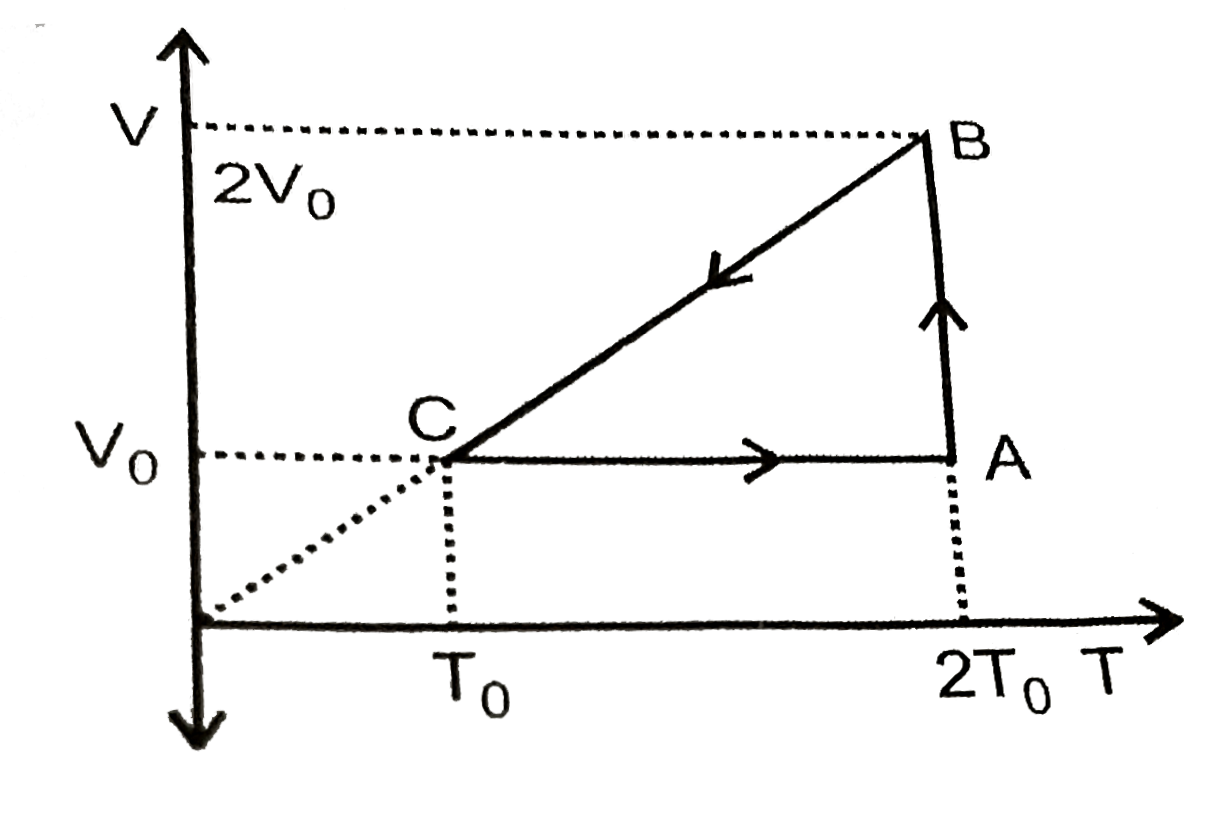Calculate the specific heat capacity Cr of a gaseous mixture consisting of v1 moles of a gas of adiabatic exponent γ1 and v2 moles of another gas of adiaqbatic exponent γ2.
To calculate the specific heat capacity Cr of a gaseous mixture consisting of v1 moles of a gas with adiabatic exponent γ1 and v2 moles of another gas with adiabatic exponent γ2, we can follow these steps:
1. Understand the relationship between specific heat capacities:
The specific heat capacity at constant volume Cv and at constant pressure Cp are related by the equation:
Cp−Cv=R
where R is the universal gas constant.
2. Express Cp in terms of Cv and γ:
The adiabatic exponent γ is defined as:
γ=CpCv
Rearranging gives us:
Cp=γCv
3. Substituting Cp into the first equation:
Substitute Cp into the equation Cp−Cv=R:
γCv−Cv=R
This simplifies to:
Cv(γ−1)=R
Thus, we can express Cv as:
Cv=Rγ−1
4. Calculate Cv1 and Cv2:
For the two gases in the mixture, we can express their specific heat capacities as:
Cv1=Rγ1−1andCv2=Rγ2−1
5. Calculate the specific heat capacity of the mixture:
The specific heat capacity Cv of the mixture can be calculated using the formula:
Cv,mixture=v1Cv1+v2Cv2v1+v2
Substituting the expressions for Cv1 and Cv2:
Cv,mixture=v1(Rγ1−1)+v2(Rγ2−1)v1+v2
6. Factor out R:
Taking R common from the numerator:
Cv,mixture=R⋅v1γ1−1+v2γ2−1v1+v2
Final Expression
Thus, the specific heat capacity Cr of the gaseous mixture is given by:
Cr=R⋅v1γ1−1+v2γ2−1v1+v2
The specific heat capacity at constant volume Cv and at constant pressure Cp are related by the equation:
Cp−Cv=R
where R is the universal gas constant.
The adiabatic exponent γ is defined as:
γ=CpCv
Rearranging gives us:
Cp=γCv
Substitute Cp into the equation Cp−Cv=R:
γCv−Cv=R
This simplifies to:
Cv(γ−1)=R
Thus, we can express Cv as:
Cv=Rγ−1
For the two gases in the mixture, we can express their specific heat capacities as:
Cv1=Rγ1−1andCv2=Rγ2−1
The specific heat capacity Cv of the mixture can be calculated using the formula:
Cv,mixture=v1Cv1+v2Cv2v1+v2
Substituting the expressions for Cv1 and Cv2:
Cv,mixture=v1(Rγ1−1)+v2(Rγ2−1)v1+v2
Taking R common from the numerator:
Cv,mixture=R⋅v1γ1−1+v2γ2−1v1+v2
Thus, the specific heat capacity Cr of the gaseous mixture is given by:
Cr=R⋅v1γ1−1+v2γ2−1v1+v2
Topper's Solved these Questions
- KINETIC THEORY OF GASES AND FIRST LAW OF THERMODYNAMICSBook:CENGAGE PHYSICS ENGLISHChapter:KINETIC THEORY OF GASES AND FIRST LAW OF THERMODYNAMICSExercise:Solved Examples
Explore 14 Videos
- KINETIC THEORY OF GASES AND FIRST LAW OF THERMODYNAMICSBook:CENGAGE PHYSICS ENGLISHChapter:KINETIC THEORY OF GASES AND FIRST LAW OF THERMODYNAMICSExercise:Exercise 2.1
Explore 20 Videos
- KINETIC THEORY OF GASESBook:CENGAGE PHYSICS ENGLISHChapter:KINETIC THEORY OF GASESExercise:Compression
Explore 2 Videos
- LINEAR AND ANGULAR SIMPLE HARMONIC MOTIONBook:CENGAGE PHYSICS ENGLISHChapter:LINEAR AND ANGULAR SIMPLE HARMONIC MOTIONExercise:Single correct anwer type
Explore 14 Videos
Similar Questions
Calculate γ of a gaseous mixture consisting of 3 moles of nitrogen and 2 moles of carbon dioxide.
View SolutionCalculate the average molar heat capacity at constant volume of a mixture containing 2 moles of monoatomic and 3 moles of diatomic ideal gas.
View SolutionThe value of γ=CpCv for a gaseous mixture consisting of 2.0 moles of oxygen and 3.0 moles of helium. The gases are assumed to be ideal.
View SolutionCalculate average molar heat capacity at constant volume of gaseous mixture contained 2 mole of each of two ideal gases A(Cv,m=32R) and B(Cv,m=52R):
View SolutionA gaseos mixture consists of equal number of moles of two ideal gases having adiabatic exponents γ1 and γ2 and molar speific heats at constant volume Cv1 and Cv2 respectively. Which of the following statements is/are correct?
View SolutionIf 3 moles of H2 gas is mixed with 2 moles of helium gas, then calculate equivalent molar mass of the gas and adiabatic exponent of the mixture?
View SolutionThe efficiency of an ideal gas with adiabatic exponent 'γ' for the shown cyclic process would be

View SolutionThe efficiency of an ideal gas with adiabatic exponent 'γ' for the shown cyclic process would be

View SolutionThe molar specific heat at constant volume of gas mixture is 13R6. The gas mixture consists of
View SolutionFind the molar heat capacity of an ideal gas with adiabatic exponent γ for the polytorpic process PVn= Constant.
View Solution
